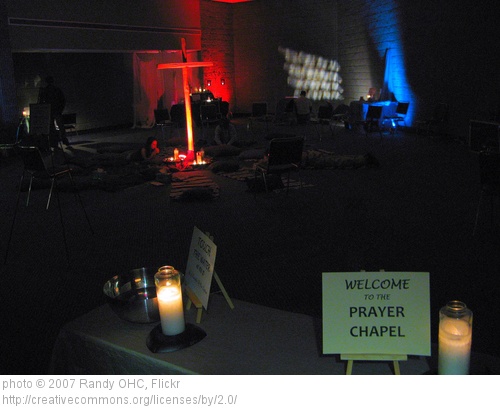This week I spent 4 days in the mountains of Idaho on a spiritual retreat. For three summers in a row this trip has profoundly affected my spiritual life. Something exciting happens when church planters and leaders get together to ponder uniting our lives to the life of God.
Over the past couple of months I’ve discovered a bit of a pattern. One of the ways I attempt to connect with God is through lectio divina (prayer-focused readings of Scripture). As I engage in this ancient practice of Christian spirituality, there are times when God shows up in beautiful ways. Lately, this has not been the case as often. It’s almost as if I sometimes take a “should” all over my spiritual life.
One of the things that I’m discovering about spiritual disciplines is that I often take that which is relational in its very nature and turn it into something mechanical. Sometimes I find myself thinking: If I carve out time to engage in lectio divina, then God will reveal Christ to me in a way that almost feels tangible.
The problem with this approach is it assumes an A + B = C sort of spirituality. If I read the Bible and pray, the formula will yield intimacy with the Spirit of Christ. So, all week long as I fail to create space for my personal holiness mechanism, I begin to use words that contaminate any spiritual vocabulary.
The words – fail, success, must, accomplish, achieve, or should – usually demonstrate that one’s faith journey has moved from relational to mechanical approaches to God. When we get to this point we’re basically taking a “should” on our lives as kingdom people.
Certainly, the opposite approach is just as bad. If we have no motivation for connecting with God, something is wrong. Or, to take it a step further, if the only time we connect with God is when we’re going through some sort of “trial” then our perception of God might be dangerously flawed. We must be leery of both extremes.
Someone who I look up to is Jan Johnson. She has led these retreats for the last 2 summers. Her work in spiritual direction and formation in partnership with Renavaré (founded by Dallas Willard) is a gift to the church. One thing she often says is:
“You do the connecting and God will do the perfecting.”
In other words, if we want to engage in deeper union with God we are invited into a posture of seeking Christ while avoiding mechanistic thinking. As we do so we can trust that God will transform our inner lives so that what we do will be energized more fully by the love of Jesus. But how do we avoid the trap of “should–ing” all over spiritual formation?
A metaphor that she offered last week (which she cited as borrowing from elsewhere) was looking at the spiritual life as a boat outing. Whenever we find ourselves measuring outcomes and assuming that transformation is primarily mechanical, it’s like we are in a small boat rowing against the wind. The more we row through our effort-driven approaches to formation, the more we find ourselves exhausted, stuck and stagnant. Even though we try and try again to connect with God we just don’t find the sort of outcomes we are looking for. Rowers run the risk of taking a “should” on their spiritual lives.
The alternative, then, is to release the paddles and to give up rowing against the wind. As a result, the air you once were fighting against now becomes the very winds of God that propel your sail. A critical difference happens at this point. Whereas rowing pushes in a direction that we think we need to go, sailing with the wind of God’s Spirit depends fully on recognizing the direction that the current is blowing.
As we discern where the winds of God are already moving we can align our spiritual sales on a course towards the unpredictable life with God. We may not know exactly where we are going, the outcomes may not be instant or foreseeable, but we can trust God to move us at the perfect pace.
What would it look like for us to set sail in a life fully directed by God’s Spirit? The answer to that question will be unique to each individual. To take it further, as the winds of God change we may find it necessary to adjust our sails (spiritual practices) depending upon the unique circumstances to come. As the winds move us, the temptation to take our relational faith and to impose a mechanical rowing system will always be present.
Let’s imagine together lives where we refuse to “should” on spiritual formation and allow the love of Christ to lure us into intimate sailing. This process will be slow and might lead us into uncharted waters at times. Yet we can be assured that if we leave the outcomes of the journey in God’s hands, that mechanical attempts will give way to a surprising relationship with the Divine.
————————————–
LIKE THIS POST? THEN CHECK OUT: “I’m Done With Living Like a Christian“












